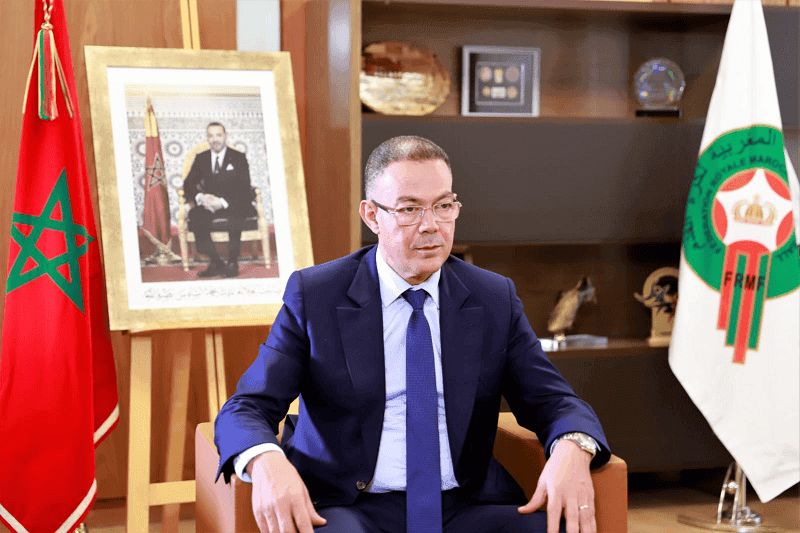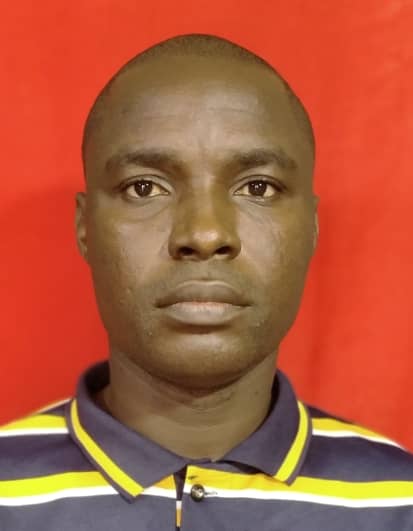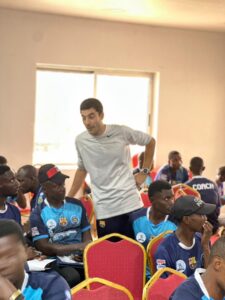From 76th To World Champions: Morocco’s Rise Under The Leadership Of Fouzi Lekjaa
3 min read
By Sportsgister
In less than a decade, Morocco has rewritten its football story — a story of vision, structure, and leadership that transformed a once-underachieving nation into a global football powerhouse.
When Fouzi Lekjaa assumed the presidency of the Royal Moroccan Football Federation (FRMF) in 2014, Morocco was languishing at 76th place in the FIFA World Rankings.
The national teams were inconsistent, infrastructure was outdated, and club football struggled to compete with the continental elite.
Today, Morocco stands tall among the world’s footballing giants — World Cup semifinalists, African club champions, and most recently, U-20 World Cup winners.
This meteoric rise did not happen by chance. It was the result of an unwavering vision, strategic leadership, and the support of His Majesty King Mohammed VI, whose belief in sports as a pillar of national development laid the foundation for enduring success.
At the center of this transformation stands Fouzi Lekjaa — a reformer, administrator, and visionary whose leadership has become synonymous with excellence in African football governance.
Under his watch, the FRMF underwent a historic restructuring aimed at ensuring accountability, professionalism, and long-term sustainability. Lekjaa’s first move was to prioritize infrastructure and youth development, believing that no nation could thrive without a strong foundation.
He spearheaded the creation of the Mohammed VI Football Complex in Salé — a $65 million world-class facility that rivals the best training centers in Europe. Spanning 30 hectares, it hosts elite academies, modern pitches, medical centers, and accommodation for players across all national teams — from U-15 to senior level.
This facility became the engine of Morocco’s footballing renaissance. It produced a new generation of technically gifted, tactically intelligent, and mentally strong players who have since dominated at continental and global levels.
Lekjaa’s reforms extended to domestic football, where he introduced new financial governance rules and professional licensing systems that stabilized Moroccan clubs.
Under his guidance, clubs like Wydad Casablanca, Raja Casablanca, and RS Berkane flourished — collectively winning multiple CAF Champions League and Confederation Cup titles over the last decade. These achievements restored Morocco’s pride as the epicenter of African club football.
Morocco also became a regular host of major CAF competitions, setting a new standard in organization, hospitality, and professionalism — attributes that have earned the nation immense respect across the footballing world.
The global breakthrough came at the 2022 FIFA World Cup in Qatar, when the Atlas Lions stunned the world by reaching the semifinals, the first African nation ever to achieve such a feat. Their disciplined, fearless, and united play reflected years of structured development and investment.
Just three years later, Morocco’s U-20 team captured the FIFA U-20 World Cup title in Chile, signaling that the nation’s success is not an isolated moment but the product of a sustainable system.
These triumphs were not merely sporting victories — they were cultural milestones that inspired millions across Africa and the Arab world.
As a CAF Executive Committee member and a key figure within FIFA, Fouzi Lekjaa’s influence now extends beyond Morocco.
He has become a driving force for reform across African football, advocating for better governance, financial transparency, and youth investment.
His strategic insight and administrative prowess have earned him admiration as Africa’s most effective football federation president, proving that success on the field begins with competence off it.
Morocco’s rise is a testament to what can happen when vision, leadership, and national unity converge.
With modern infrastructure, elite academies, structured leagues, and strong government support, Morocco has built a model admired globally one that could redefine African football for generations.
The “Moroccan Model” is no longer a dream. It is a proven formula. A system where governance replaces guesswork, and investment replaces improvisation.
From 76th in the world to world champions this is not luck.
It is leadership in motion, guided by Fouzi Lekjaa’s strategic brilliance and King Mohammed VI’s visionary support.
Morocco has not just risen. It has redefined what is possible.
And in doing so, it has inspired a continent to believe again.

Sedara Philip is a Sports writer, an administrator,Journalist,and editor






